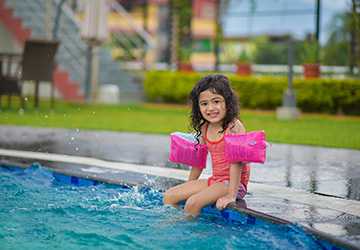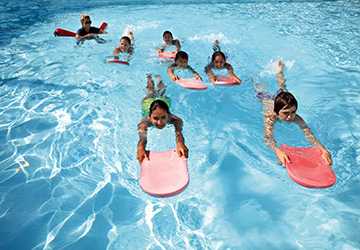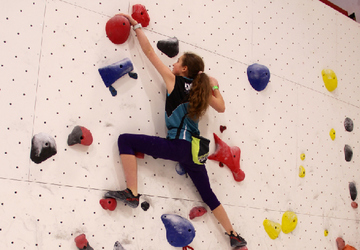The question of when to start swimming for children is a topic that many parents ponder over. With the increased awareness of the importance of early childhood development and the critical role that physical activities play in it, swimming has become more than just a recreational activity. It's now considered an essential life skill. This comprehensive article will delve into various facets that influence the ideal time for kids' swimming classes, such as developmental milestones, safety considerations, and emotional readiness.

Age and Physical Development: What the Experts Say
Swimming is a physically demanding activity that involves a range of motor skills. Therefore, aligning the timing of starting swimming lessons with a child's physical development is essential. Experts say the best age for kids' swimming lessons is often around 4 to 5 years old. Children generally have developed enough muscle strength, coordination, and cognitive abilities to grasp swimming basics by this age. However, some swim programs offer water familiarization courses for babies as young as six months old, focusing more on water comfort than swimming skills. But remember, each child is different, so these are guidelines rather than strict rules.
Emotional Readiness: An Often Overlooked Factor
When considering when to start swimming for children, emotional readiness is an often overlooked but crucial factor. Some children may exhibit apprehension towards water and unfamiliar environments, making it challenging to teach them how to swim. On the other hand, some kids naturally take to water and display a level of comfort and enthusiasm that makes them suitable candidates for early swimming lessons. Observing your child's emotional cues can offer invaluable insights into their readiness for swim classes and thus should be a pivotal part of your decision-making process.
Safety Concerns: The Role of Supervision and Skilled Instructors
Safety is paramount when it comes to kids and swimming. One must ensure that the swimming facility is up to standard and that the instructors are skilled and certified. Checking certifications, reading reviews, and even watching a class before enrolling can give you a good idea of what to expect. Additionally, constant adult supervision is non-negotiable irrespective of the best age for kids' swimming lessons. Even if a child knows basic swimming, the risk of accidents still exists, and vigilance is essential.
Seasonal Timing: Is There an Ideal Time of Year to Start?
While age and readiness are key factors, some parents also wonder if there's an ideal season for starting swimming lessons. Generally, indoor pools offer the flexibility of year-round classes, but some families prefer to start in the spring to prepare for summer activities. The season choice can also affect the child's comfort and willingness to participate. For instance, starting in the warmer months may provide beginners with a more agreeable water temperature.
Preparing Your Child: The Importance of Early Communication
Before enrolling your child in swim classes, talking to them about what to expect is beneficial. Reading books or watching videos about swimming can help build excitement and lessen anxieties. Knowing that their parents are enthusiastic and supportive can make children more eager to participate, enhancing their learning experience.

Cognitive and Academic Advancements: More Than Just Physical Exercise
It may surprise some, but research indicates that children who engage in regular swimming lessons often outperform their non-swimming peers in a range of cognitive and academic tests. Studies show that the repetitive nature of swimming strokes can help improve motor skills, which, in turn, contribute to better handwriting and artistic abilities. Furthermore, balancing oneself in water requires a degree of concentration and focus, attributes that are transferable to academic settings. Therefore, parents aiming to provide a well-rounded education may find it beneficial to enrol kids in swimming lessons early on.
Social Skills: The Underestimated Bonus of Group Lessons
Group swim lessons offer more than cost-effectiveness; they allow social interaction and development. Children learn to take turns, listen to instructions, and cooperate in a team setting, all of which are crucial life skills. As your child learns to interact with their peers and instructors, they naturally develop better communication skills and emotional intelligence. So, when pondering the best age for kids' swimming lessons, consider the social advantages of it.
Lifelong Health Habits: Instilling the Love for Physical Activity
One of the most understated benefits of early swimming lessons is cultivating a healthy lifestyle. As children grow older, those exposed to regular physical activities like swimming are likelier to continue participating. Therefore, the ideal time for kids' swimming classes might be when they are young enough to form habits that will last a lifetime. These lifelong exercise routines can be the cornerstone for a healthier adult life, potentially preventing various lifestyle-related ailments in the future.
Parent-Child Bonding: Making Time for What Matters
Believe it or not, swimming lessons are an excellent opportunity for parent-child bonding, especially if you engage in parent-toddler classes. These classes allow parents to be in the water with their children, facilitating a sense of security and trust that can benefit the child emotionally. Such bonding time can be a sanctuary in today's fast-paced life, making swimming lessons a weekend activity and a cherished family routine.
The Takeaway: It's More than Just a Number
To sum it up, determining the ideal time for kids' swimming classes is not solely dependent on age but is a multifaceted decision. It involves understanding your child's physical abilities and emotional readiness and entails logistical and safety considerations. Making an informed choice will ensure your child's safety and make the learning process enjoyable and effective. Therefore, take your time, do your research, and make the decision.








